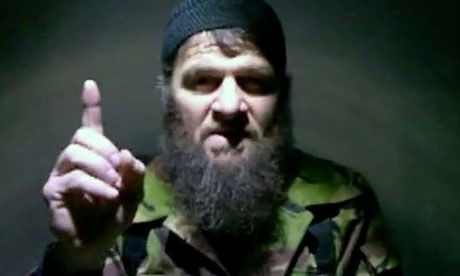
Dagestani Militant Leader Brokers Reconciliation Deal Between Chechen Commanders
Publication: Eurasia Daily Monitor Volume: 8 Issue: 145
By:

The history of the conflict resembles a detective novel. One year ago, on July 24, 2010, Doku Umarov, in his capacity as leader of the armed resistance in the North Caucasus, appointed Emir Aslanbek (aka Aslanbek Vadalov) as his future successor. In the same address, Umarov said he had appointed another well-known Chechen commander, Emir Khusein (Khusein Gakaev), as the head of Chechnya (aka Velayat Nokhchiycho) (www.kavkazcenter.com, July 24, 2010). Doku Umarov himself had simultaneously occupied both positions since 2006. A week later, on August 2, 2010, taking everyone by surprise, Umarov declared before the cameras that he was stepping down as head of the North Caucasus armed resistance movement for health reasons. He said he planned to appoint as his replacement one of the most well-known Chechen commanders, his first deputy (aka naib) Aslanbek Vadalov (www.newsru.com, August 2, 2010). Umarov asked his acolytes from among the Dagestanis, Ingush, Kabardians and Balkars to accept his choice (www.youtube.com/watch?v=aE17R5guzSc). Vadalov’s closest associates, Emirs Khusein (aka Khusein Gakaev), Tarkhan (Tarkhan Gaziev) and Mukhannad, addressed them, calling Umarov’s choice worthy (www.youtube.com/watch?v=0YVXL7az5HM&feature=related).
Movladi Udugov, the main person responsible for the armed resistance’s media, misjudged those events. Udugov not only hurriedly broadcast this decision, but also gave favorable publicity to Vadalov, presenting him as a person faithful to the idea of the Caucasus Emirate. Further, Udugov claimed Vadalov was the first to take an oath of allegiance to Doku Umarov, which was not true. Consequently, Umarov temporarily suspended Udugov as the head of the Caucasus Emirate’s information resources (www.kavkaz-uzel.ru/articles/172795). Akhmed Zakaev quickly reacted to the change in the resistance’s leadership, assuming that the new leader of the militants would want to have peace talks with Russia and imagining himself as the main negotiator in that process (https://inosmi.ru/politic/20100804/161844865.html). Further developments, however, showed that Zakaev failed to establish proper ties with Vadalov throughout the period of the schism in the resistance, or to become his political wing to represent the armed resistance in the West.
The most curious event, along with the travails of the Chechen commanders, involved Umarov himself, who subsequently announced in a video address posted to the Internet that he had in fact refused to step down as leader of the Caucasus Emirate. Moreover, Umarov reassured his audience that he was in good health and that his August 2, 2010, video announcement had been forged (https://ia700505.us.archive.org/15/items/SpecialnoeZajavlenieAmiraDokkuAbuUsmana/spec_zay_dokka_2010_augu.wmv).
Bewildered by the development, the Chechen commanders Vadalov, Gakaev and Gaziev announced their resignations and refusal to subordinate to Umarov – who, in their words, had turned out to be an incompetent leader (www.kavkazcenter.com, August 13, 2010).
In September 2010, the dissident Chechen commanders addressed the Chechen people, attempting to explain their position and why they were not prepared to tolerate Umarov’s leadership (www.youtube.com/watch?v=WxkB-Vw7FMs). The Chechen commanders and their men comprised almost the entire Chechen resistance, with the exception of the small circle around Umarov and Supiyan Abdullaev that relied more often on the Ingush members of the resistance rather than on the Chechens. The main take away from the commanders’ address was that the dissident leaders admitted that almost all Chechen commanders sided with them and that Doku Umarov was to blame for the dead-end situation.
In response to this video address, Umarov demoted all the dissident commanders and called upon them to appear before the Sharia court (www.kavkaz-uzel.ru/articles/174548). Umarov, however, placed all the blame for the conflict on Emir Mukhannad (https://hunafa.info, September 25, 2010), an Arab volunteer who was later killed in a Russian special operation (on April 22, 2011).
Subsequently, the Caucasus Emirate launched a campaign against the secessionist commanders, trying to prove their guilt. Middle Eastern sheiks were summoned up to support Umarov and issued fatwahs supporting him, one after another, not overly burdening themselves with attempts to understand the essence of the conflict (www.youtube.com/watch?v=zCabnQeiEa8&feature=player_embedded).
The Dagestanis in turn sided with Umarov and provided him with powerful support from the very beginning of the schism (https://kavkazcenter.com/russ/content/2010/08/13/74527.shtml). The Dagestani rebels urged, in very strong terms, that the legality of Umarov’s leadership not be questioned. The emir of Ingushetia, Adam, and the emir of Kabardino-Balkaria, Seifullah, also did not shy away from supporting Umarov.
The death of Umarov’s closest associate, Supiyan (Supiyan Abdullaev), on March 22, 2011 and the death of emir Mukhannad apparently made the schism issue more relevant for Umarov. While Umarov was inclined to blame Mukhannad for the militants’ internal conflict, the dissident commanders held Supiyan responsible for convincing Umarov to retract his resignation. Thus, since the two main figures in the split had died, a dialogue between the two sides became possible and realistic, especially as the dissident commanders had failed to secure a permanent independent channel of support abroad, in the diaspora. So they found themselves isolated from the outside world.
In his turn, Umarov, having had support from abroad, failed to find viable replacement figures for the Chechen commanders who renounced him. In other words, Umarov was the head of the North Caucasian militants, but not of the Chechens themselves. This was bound to make his future position quite precarious.
Thus, both sides of the conflict needed a face-saving form of reconciliation. The fact that the previously demoted commanders became Umarov’s deputies reaffirms that they have the real power. At the same time, the fact that the dissident commanders submitted to Umarov also strengthened his positions among the non-Chechen sector of the resistance. Umarov scored this victory with the assistance of Emir Salikh (Ibragimkhalil Daudov), the leader of the Dagestani jamaat, and Sheikh Abu Mukhammad Ad-Dagestani, the Caucasus Emirate kadi (Muslim judge).
It can be concluded that both sides of the conflict have benefited from reconciliation, having essentially returned to their original positions prior to the conflict in July 2010.




